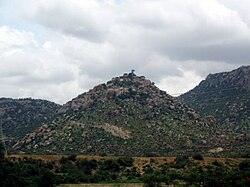Penukonda (city)
|
Penukonda Village |
|
|---|---|

Chilla Pahad near Penukonda
|
|
| Coordinates: 14°05′06″N 77°35′46″E / 14.085°N 77.596°ECoordinates: 14°05′06″N 77°35′46″E / 14.085°N 77.596°E | |
| Country |
|
| State | Andhra Pradesh |
| District | Anantapur |
| Government | |
| • Type | Panchayati raj |
| • Body | Gram Panchayat |
| Area | |
| • Total | 6.5 km2 (2.5 sq mi) |
| Elevation | 769 m (2,523 ft) |
| Population (2011) | |
| • Total | 27,382 |
| • Density | 4,200/km2 (11,000/sq mi) |
| Demonym(s) | penukondavi |
| Languages | |
| • Official | Telugu |
| Time zone | IST (UTC+5:30) |
| Vehicle registration | AP 02 |
| Nearest city | Hindupur |
| Vidhan Sabha constituency | Penukonda |
Penukonda is a town in the Anantapur district of Andhra Pradesh, India. It is 70 km away from Anantapur (Officially: Anantapuramu) town. This town is different from similar-sounding Penugonda. This town contains approximately 365 temples built during Vijayanagara rule. It was the second capital of Vijayanagara kingdom. Today, the place is famous for its Sri Kaleswar Swamy Ashram that draws people from world over. The ashram houses a training centre for advanced spirituality, Sri Kaleshwar Soul University. It is located with in the ancient fort complex, beneath the backdrop of Penukonda Mountain with its dozen temples and hidden meditation caves.
Penukonda has an average elevation of 769 metres (2526 ft).
According to The Imperial Gazetteer of India, Penukonda was a subdivision and taluk of Anantapur district in Madras province. It contains 96 villages covering an area of 677 square miles. The population in 1901 was 92,482 compared with 81,104 in 1891. Penukonda was the headquarters with a population of 6,806. It is situated at the base of a large hill (Konda in Telugu language), from which it takes the name. It is a place of historical importance. It became the capital of fallen Vijayanagar monarch, after he was overthrown in 1565 at the Battle of Talikota. The Penner River flows along its western and Chitravati river along its eastern boundary.
A famous medieval fort is located in the town.
This region was controlled at different points in history by the Hoysalas, Chalukyas, Vijayanagar, Nawabs, Maratha chieftain Murari Rao, Tipu Sultan, Nizam and eventually came under British rule after it was ceded to the British by the Nizam of Hyderabad. It was a melting pot of different religions but the town and fort were established by early Hoysala kings, who were practitioners of Jainism.
...
Wikipedia

